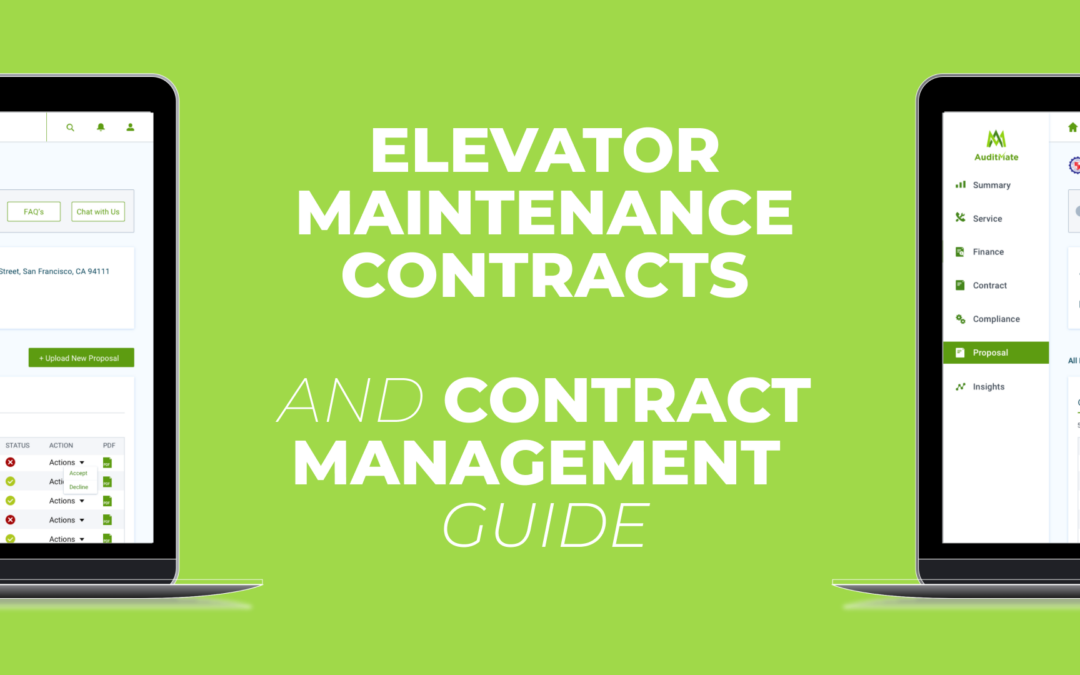Managing elevator maintenance contracts can be a headache for building owners. Did you know that these contracts often last 7 to 25 years? This guide will help you save money and avoid costly mistakes with your elevator upkeep.
Read on to learn smart tips for elevator contract management.
Understanding Elevator Maintenance Contracts
Elevator maintenance contracts can be tricky. They have many parts that need careful reading.
Contract Duration
Contract duration is a key part of elevator maintenance deals. These contracts can last from 7 to 25 years. Longer deals often mean better prices and protection from rising costs. But they also come with risks.
You might end up stuck with a service you don’t like for a long time.
A well-chosen contract length balances cost savings with flexibility.
Clients need to think hard about how long they want their contract to be. It’s smart to tell your service provider 3-4 months before you want to make any changes. This gives both sides time to talk and agree on new terms.
Picking the right length can save money and keep your elevators running smoothly.
Frequency of Maintenance
Elevator maintenance needs to happen often. Building owners must check how many times a year their elevators get fixed. This number should match what’s in the contract. It’s smart to keep a log of all visits.
This helps track if the company is doing its job right.
Regular upkeep keeps elevators safe and working well. It stops big problems before they start. This saves money on costly emergency fixes. The next part will talk about how to pick the best contract type for your needs.
Automatic vs. Manual Renewal
Automatic renewal ensures your elevator operates efficiently. It’s a practical option for building owners and facility managers. This contract type self-renews annually. You avoid concerns about service interruptions or overlooking renewals.
It conserves time and reduces errors.
Manual renewal requires more effort on your part. You need to remember to renew your contract before expiration. Forgetting might result in service loss. This can create issues for your building and its occupants.
Many professionals recommend automatic renewal for improved service and reduced stress. Here are some essential tips for managing these contracts.
Key Exclusions
Moving from renewal options, let’s look at what’s not covered in elevator contracts. Key exclusions are vital to understand. These are costs you’ll have to pay on top of your contract.
Most contracts don’t cover damage from vandalism or floods. They also skip costs for old or special parts. Owners must pay for car damage, stuck items, and broken buttons. Some events, like storms, aren’t covered either.
Knowing these gaps helps you plan better for surprise costs.
Understanding contract exclusions is crucial for effective budget management.
Key Tips for Managing Elevator Maintenance Contracts
Managing elevator maintenance contracts wisely can lead to big savings. Read on for key tips to cut costs and boost efficiency.
Evaluate Different Contract Types
Different elevator contracts offer unique benefits. Full Maintenance Contracts (FMC) shift risk to the service provider. This helps owners plan budgets better. Parts, Oil, and Grease Contracts (POG) cost less but need more tracking.
They don’t cover as much as FMCs. Survey and Report Contracts only focus on checks. These may increase owner liability for fixes and accidents.
Picking the right contract type is key. Owners must think about their needs and budget. FMCs provide peace of mind but cost more. POGs save money but require more work from owners.
Survey contracts are cheap but risky. Each type has pros and cons. Smart owners weigh these carefully before signing.
Prepare for Potential Repair Costs
Elevator repairs can hit your wallet hard. Smart building owners set money aside for surprise fixes. This helps most with partial and POG contracts. These deals don’t cover all repair costs.
You’ll need to pay for some fixes out of pocket.
Annual maintenance contracts (AMCs) offer more peace of mind. They cover regular checks and many repairs. AMCs help keep elevators running smoothly. They also cut down on breakdowns.
In Dubai, AMCs cost about AED 1,000 to AED 4,000 per elevator each month. Next, let’s look at how to pick the right contract type for your needs.
Negotiate Contract Terms Effectively
Negotiate contract terms before signing. This step is key to getting a good deal. Ask for clear details on how often they’ll do maintenance. For example, say “monthly” or “quarterly” instead of vague words.
Also, ask for reports on what they fix. This helps you track issues and plan for the future.
Set clear rates for repairs and callbacks in your contract. This helps you manage your budget better. You’ll know what to expect when something breaks. It also stops surprise costs later on.
Next, let’s look at why reviewing your contract is so important.
The Importance of Contract Review
Contract review is a vital step in elevator maintenance. It helps spot risks and ensures legal compliance.
Identifying Potential Risks
Spotting risks in elevator contracts is key. Building owners must look for unclear terms or hidden costs. These can lead to big problems later. A good review checks if the contract follows all laws.
It also makes sure the terms are fair for both sides.
Regular checks help catch issues early. This keeps small problems from growing. Smart owners involve different team members in reviews. Each person brings unique skills to spot risks.
Clear language in contracts cuts down on confusion. This makes it easier to avoid future fights or legal trouble.
Ensuring Compliance with Legal Standards
Legal standards are key in elevator maintenance. Building owners must follow rules to keep people safe. These rules cover how often to check elevators and how to fix them. They also say how to make elevators work for everyone, including those with disabilities.
Not following these rules can lead to big problems. Accidents might happen, and owners could face fines or lawsuits.
A business lawyer can help owners understand these legal standards. They can review contracts to make sure they meet all rules. This step is vital for building safety and avoiding legal trouble.
Lawyers can spot issues in contracts that owners might miss. They can also suggest changes to keep the building up to code and protect the owner’s interests.
Conclusion
Smart elevator management saves money. Good contracts keep your building safe and running well. AuditMate helps you stay on top of it all. This software makes it easy to check on vendors and keep up with schedules.
Want to save more and worry less? Reach out to AuditMate today for a demo.
FAQs
1. How can I save money on elevator upkeep?
To cut costs on lift care, look into maintenance deals. These agreements… well, they’re like a safety net. They cover regular check-ups, fixes, and part swaps. By getting one, you dodge surprise bills and keep your elevator running smooth.
2. What should I watch for in a lift service contract?
Keep your eyes peeled for clear terms. Good deals spell out what’s covered – and what’s not. They’ll list how often techs visit, response times for issues, and costs for extra work. Don’t forget to check how long the deal lasts and how to end it if needed.
3. Why is managing these contracts so important?
Staying on top of lift deals is key. It helps you track when services happen, spot patterns in breakdowns, and plan for future costs. Good management means you’re not caught off guard by renewal dates or price hikes. It’s all about being smart with your cash.
4. Can better contract handling really boost my savings?
You bet it can! Smart contract handling is like finding hidden treasure. It helps you spot chances to bundle services, negotiate better rates, and cut out stuff you don’t need. Plus, it keeps you ready for talks when it’s time to renew. In the end, you could see big drops in your upkeep bills.

